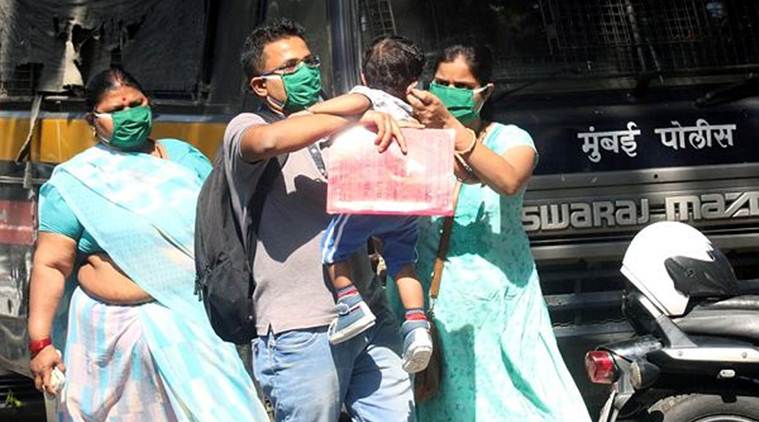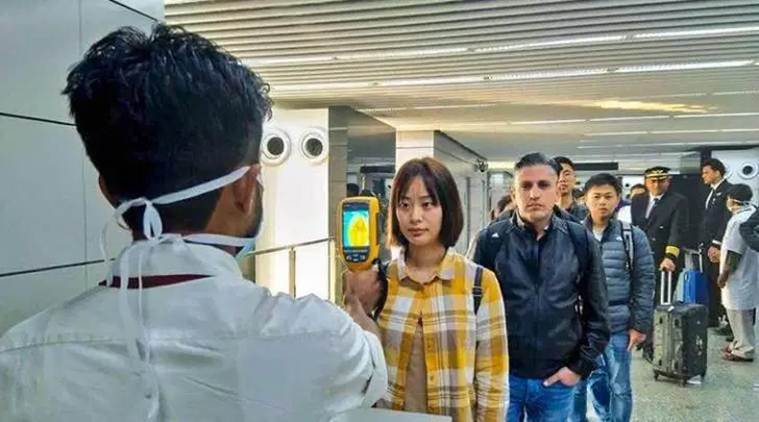 Workers from a Servpro disaster recovery team wearing protective suits and respirators wait outside before entering the Life Care Center in Kirkland, Wash., to begin cleaning and disinfecting the facility
Workers from a Servpro disaster recovery team wearing protective suits and respirators wait outside before entering the Life Care Center in Kirkland, Wash., to begin cleaning and disinfecting the facility
Written by Sagar Atre, Mukta Gundi
There are two possible ways to react to a viral pandemic. One would be like Singapore, to initiate a system-wide, coherent medical response. And the other is to be Donald Trump and call it a ‘foreign virus’ and instigate xenophobia.
Apart from the obvious public health impact of pandemics, they have a wider, more pervasive impact on social psychology. Ranging from senior politicians to common citizens, pandemics can often precipitate racial and religious biases and resultant hate crimes. An incident in New Delhi where two Delhi University students from the Northeast were called out for being a ‘coronavirus’ and a similar incident in New York City where a woman of Asian descent was attacked for falsely being believed to be a carrier of the virus are symptoms of the same malaise.
Pandemic and xenophobia
Multiple factors contribute to creating an atmosphere which can either reassure or stoke fear-based reactions to pandemics. Irresponsible comments and actions by prominent politicians, public figures, leaders and media personalities are some such factors. President Donald Trump’s lacklustre, ill-informed response and speeches have been widely criticised for being unprepared to tackle a major crisis and for shirking the responsibility when a coherent response is needed, since the virus has now potentially spread to large swathes of the US. Trump has further stoked the rhetoric by declaring that measures like the wall on the border of Mexico are now an even more urgent necessity, whereas there were no reported cases in Mexico when the statement was made.
Xenophobic responses to epidemics are not a new phenomenon per se. Previous instances of viral outbreaks across different countries saw familiar discriminatory responses. For instance, European immigrants in the southern states of United States had faced discrimination during the yellow fever epidemic in the late 19th century. Even the 2014 Ebola outbreak saw extreme discriminatory reactions such as denial of admission to students from countries with confirmed Ebola cases. The contribution of social media in othering the people of Asian ethnicity and in normalising racism and xenophobia in times of Corona pandemic cannot be ignored.
Pandemics, especially when their visible health impact is not widely known, often create what psychologist Steven Taylor calls a ‘psychological immune response’. Simple, mundane actions such as sneezing, coughing and showing signs of being ill among someone who can be misconstrued to be originating from the epicentre of the disease can trigger an immediate panic response and result in hate speech, racial bullying or even physical attacks. More troublingly, such behaviour can be normalised by law enforcers and persons in positions of authority.
Opinion | Tavleen Singh writes: Corona times: If there ever was a time when politics should take a backseat, it is now
 People wearing a facemask amid concerns of the spread of coronavirus, outside Kasturba Hospital in Mumbai on Sunday. (Express photo/Ganesh Shirsekar)
People wearing a facemask amid concerns of the spread of coronavirus, outside Kasturba Hospital in Mumbai on Sunday. (Express photo/Ganesh Shirsekar)
In Delhi, the police dismissed the bullying of the Northeastern students as a routine phenomenon during Holi, and senior Republican officials in the United States declared that China should be disconnected from the ‘civilised world’ for spreading diseases like these through abnormal food behaviours like eating live bats and other exotic animals.
The phenomenon of ‘othering’ certain communities is often manifested in such public reactions where customs, practices and divergent food habits and preferences are easily blamed for triggering pandemics. In the current climate, when populist sentiment and a pervasive atmosphere of suspicion is already prevalent in many major nations including the United States, India, Brazil and many others, such sentiments can often be sharpened by the arrival of a pandemic and can falsely bolster leaders’ arguments of having stronger border controls and isolation from the rest of the world.
Pandemics and PTSD
Another factor which can exacerbate stress and violent responses due to it are the suspension of public activities and spaces including malls, movies and religious or cultural events. These curbs often steal the feeling of normalcy from daily life. Studies of quarantined patients showed that patients often faced symptoms akin to post-traumatic stress disorder, especially if they developed symptoms similar to the ongoing pandemic. The reflexive denial of having a new, unknown disease and being in isolation can lead to severe psychological reactions among quarantined patients, often due to the fact that there is improper communication of the reasons for the quarantine, a belief of being unfairly isolated and leading to blaming the government system, healthcare institutions and other entities including employers.
Many scientists have presciently understood the social dynamics and sought to address the ramifications of such pandemics, a prominent one among which is Dr. Anthony Fauci, a veteran of many pandemics and the head of the US National Institute of Allergic and Infectious Diseases (NIAID) of the National Institutes of Health (NIH). Fauci has often served as an effective messenger to explain and simplify the science and clarify misconceptions, often even aiding US politicians and bureaucrats in communicating to the public. Having such calming voices is one of the best bulwarks against the public panic that grips society during such pandemics. Thankfully, most of India’s leaders and politicians have not yet made any major irresponsible comments on the ongoing pandemic. Scientists from the Indian Council of Medical Research and others too have aimed to be transparent and clear in their communication. While India’s surveillance systems and its speed to responding to the disease have been dissected and criticized in the media, the debates have been well within the limits of academic and civilized debate. The only prominent example of outlandish behaviour is probably RPI Chief Ramdas Athawale’s viral video where he is seen chanting “Go Corona!” in a bid to implore the virus to go from India, with none other than a Chinese envoy chanting it with him. However, this behaviour is more comical than dangerous.
Opinion | Shah Alam Khan writes: Coronavirus threat is real, but responses to it are bordering on paranoia
 Multiple factors contribute to creating an atmosphere which can either reassure or stoke fear-based reactions to pandemics.
Multiple factors contribute to creating an atmosphere which can either reassure or stoke fear-based reactions to pandemics.
Is our fear selective?
Another side of this spike of fear, however, is how immunised to fear India and many other nations as societies have become to diseases which are actually much more deep rooted and dangerous. Noted public health scientist Dr Vikram Patel pointed out in a recent column that depicts a reality antithetical to the fear of Coronavirus among the public. While the current pandemic is earning phenomenal media coverage, attention, and ceaseless questions from the public, diseases much more prevalent and deadlier than the COVID-19 remain unattended for generations. Patel notes that a single disease in India, tuberculosis, remains a much bigger threat for most Indians than Corona can possibly ever be. To illustrate the disparate impact of tuberculosis of India, Patel cited one simple statistic, the total global death toll of coronavirus is easily surpassed by tuberculosis deaths in India in a single week. However, since tuberculosis remains a disease of the poor, living in squalid, unhygienic conditions and since those affected with it rarely transgress the boundaries of airport lounges, five-star hotels and corporate offices, the thoughts of improving the lacklustre response to TB is easily quarantined by policymakers and affluent citizens can as easily go on about their lives without fear. Similar to the now ubiquitously cited curve justifying social distancing for preventing an overburdened health system, much deadlier, yet historic diseases do not lead to a ‘psychological immune response’ like COVID-19 does in terms of overwhelming the social psyche with a multitude of fears. Whether our selective fear for certain epidemics and pandemics such as coronavirus is due to its novelty or due to lack of information is something to ponder upon.
 Previous instances of viral outbreaks across different countries saw familiar discriminatory responses.
Previous instances of viral outbreaks across different countries saw familiar discriminatory responses.
Controlling fear, PTSD and stigma
Fear is often a powerful and necessary instinct which triggers necessary responses for averting danger and preserving human life and the body. However, it is imperative to tackle dangerous misinformation, discrimination, xenophobia and actions stemming from a herd mentality such as hoarding and panic buying of vital resources. The appropriate amount of urgency, imbibed through clear, transparent and ubiquitous information and messaging can help elicit appropriate action from the public in terms of taking precautions, following public health directives and seeking information only from authoritative sources. Since COVID-19 is probably the world’s first pandemic in the age of social media, managing the messages and the messenger is necessary for avoiding unwanted social ramifications beyond the spread of disease. Measures have to be taken so that people do not use the platform for a blame-game. As suggested by the advisory of the Centre for Disease Control (CDC), public health efforts need to be combined with appropriate measures to maintain the confidentiality of those who have been isolated, tested positive or have died of Corona. Newspapers and media outlets should be discouraged from using stereotypical images of people from a specific ethnicity or a country. It is equally important to make the public aware of how xenophobia, and fearful responses could be hurtful to society. Equipping everyone with accurate information through local newspapers, local media and art is essential if we do not want to allow our minds to be exclusionary in this time of public health crisis.
The social psychology of pandemic is not easy to influence but the message needs to be clear- ‘virus has no face and no race’. Public health efforts must consider the social psychology of pandemics if we want both the virus and the fear to stop spreading.
Sagar Atre is a Program Manager India Health Fund, a company dedicated to fostering innovations in the realm of TB, Malaria and other infectious diseases. Mukta Gundi is a PhD Scholar of Social Epidemiology at IIT Gandhinagar and currently a Program Officer at Population Council, a public health research organization in New Delhi.